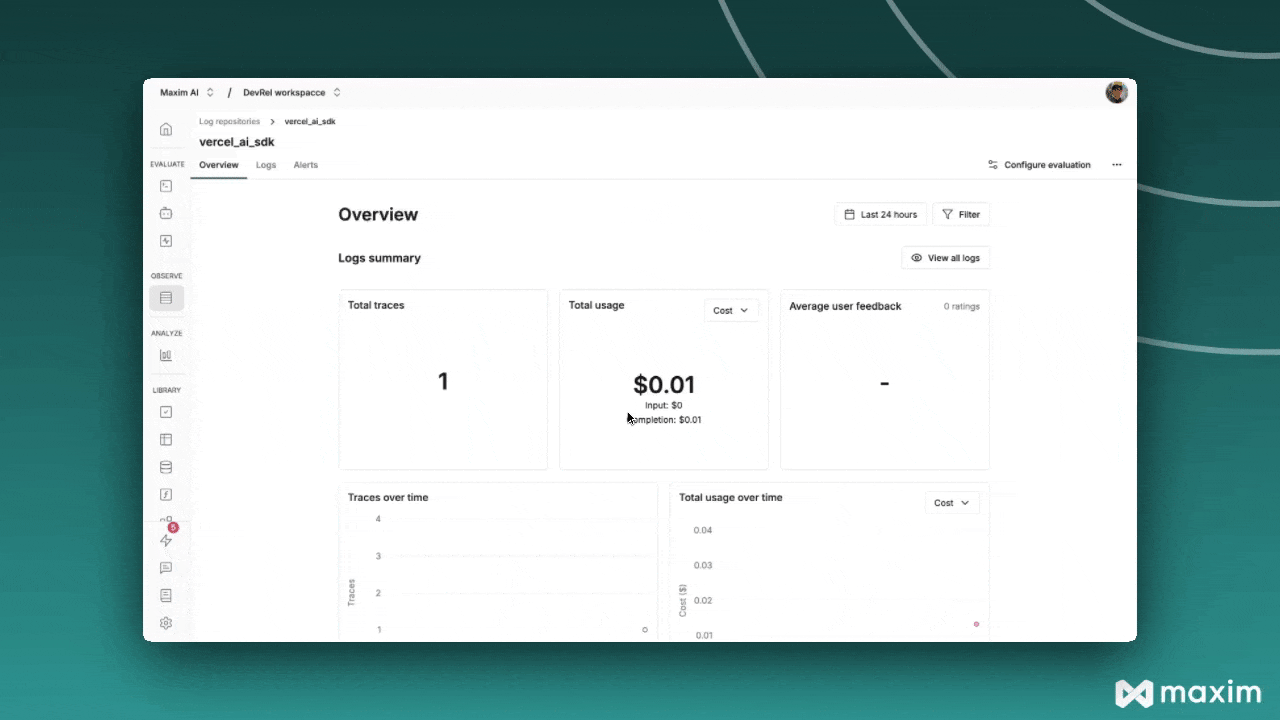Maxim Observability
Maxim AI streamlines AI application development and deployment by applying traditional software best practices to non-deterministic AI workflows. Our evaluation and observability tools help teams maintain quality, reliability, and speed throughout the AI application lifecycle. Maxim integrates with the AI SDK to provide:
-
Automatic Observability – Adds tracing, logging, and metadata to AI SDK calls with a simple wrapper.
-
Unified Model Wrapping – Supports OpenAI, Anthropic, and Google etc. models uniformly.
-
Custom Metadata & Tagging – Enables attaching trace names, tags, and session IDs to track usage.
-
Streaming & Structured Output Support – Handles streaming responses and structured outputs seamlessly.
Setting up Maxim with the AI SDK
Requirements
"ai""@ai-sdk/openai""@ai-sdk/anthropic""@ai-sdk/google""@maximai/maxim-js"Environment Variables
MAXIM_API_KEY=MAXIM_LOG_REPO_ID=OPENAI_API_KEY=ANTHROPIC_API_KEY=Initialize Logger
import { Maxim } from '@maximai/maxim-js';
async function initializeMaxim() { const apiKey = process.env.MAXIM_API_KEY || ''; if (!apiKey) { throw new Error( 'MAXIM_API_KEY is not defined in the environment variables', ); }
const maxim = new Maxim({ apiKey }); const logger = await maxim.logger({ id: process.env.MAXIM_LOG_REPO_ID || '', });
if (!logger) { throw new Error('Logger is not available'); }
return { maxim, logger };}Wrap AI SDK Models with Maxim
import { openai } from '@ai-sdk/openai';import { wrapMaximAISDKModel } from '@maximai/maxim-js/vercel-ai-sdk';
const model = wrapMaximAISDKModel(openai('gpt-4'), logger);Make LLM calls using wrapped models
import { generateText } from 'ai';import { openai } from '@ai-sdk/openai';import { wrapMaximAISDKModel } from '@maximai/maxim-js/vercel-ai-sdk';
const model = wrapMaximAISDKModel(openai('gpt-4'), logger);
// Generate text with automatic loggingconst response = await generateText({ model: model, prompt: 'Write a haiku about recursion in programming.', temperature: 0.8, system: 'You are a helpful assistant.',});
console.log('Response:', response.text);Working with Different AI SDK Functions
The wrapped model works seamlessly with all Vercel AI SDK functions:
Generate Object
import { generateObject } from 'ai';import { z } from 'zod';
const response = await generateObject({ model: model, prompt: 'Generate a user profile for John Doe', schema: z.object({ name: z.string(), age: z.number(), email: z.string().email(), interests: z.array(z.string()), }),});
console.log(response.object);Stream Text
import { streamText } from 'ai';
const { textStream } = await streamText({ model: model, prompt: 'Write a short story about space exploration', system: 'You are a creative writer',});
for await (const textPart of textStream) { process.stdout.write(textPart);}Custom Metadata and Tracing
Using Custom Metadata
import { MaximVercelProviderMetadata } from '@maximai/maxim-js/vercel-ai-sdk';
const response = await generateText({ model: model, prompt: 'Hello, how are you?', providerOptions: { maxim: { traceName: 'custom-trace-name', traceTags: { type: 'demo', priority: 'high', }, } as MaximVercelProviderMetadata, },});Available Metadata Fields
Entity Naming:
sessionName- Override the default session nametraceName- Override the default trace namespanName- Override the default span namegenerationName- Override the default LLM generation name
Entity Tagging:
sessionTags- Add custom tags to the session(object: {key: value})traceTags- Add custom tags to the trace(object: {key: value})spanTags- Add custom tags to span(object: {key: value})generationTags- Add custom tags to LLM generations(object: {key: value})
ID References:
sessionId- Link this trace to an existing sessiontraceId- Use a specific trace IDspanId- Use a specific span ID

Streaming Support
import { streamText } from 'ai';import { openai } from '@ai-sdk/openai';import { wrapMaximAISDKModel, MaximVercelProviderMetadata } from '@maximai/maxim-js/vercel-ai-sdk';
const model = wrapMaximAISDKModel(openai('gpt-4'), logger);
const { textStream } = await streamText({ model: model, prompt: 'Write a story about a robot learning to paint.', system: 'You are a creative storyteller', providerOptions: { maxim: { traceName: 'Story Generation', traceTags: { type: 'creative', format: 'streaming' }, } as MaximVercelProviderMetadata, },});
for await (const textPart of textStream) { process.stdout.write(textPart);}Multiple Provider Support
import { openai } from '@ai-sdk/openai';import { anthropic } from '@ai-sdk/anthropic';import { google } from '@ai-sdk/google';import { wrapMaximAISDKModel } from '@maximai/maxim-js/vercel-ai-sdk';
// Wrap different provider modelsconst openaiModel = wrapMaximAISDKModel(openai('gpt-4'), logger);const anthropicModel = wrapMaximAISDKModel( anthropic('claude-3-5-sonnet-20241022'), logger,);const googleModel = wrapMaximAISDKModel(google('gemini-pro'), logger);
// Use them with the same interfaceconst responses = await Promise.all([ generateText({ model: openaiModel, prompt: 'Hello from OpenAI' }), generateText({ model: anthropicModel, prompt: 'Hello from Anthropic' }), generateText({ model: googleModel, prompt: 'Hello from Google' }),]);Next.js Integration
API Route Example
// app/api/chat/route.jsimport { streamText } from 'ai';import { openai } from '@ai-sdk/openai';import { wrapMaximAISDKModel, MaximVercelProviderMetadata } from '@maximai/maxim-js/vercel-ai-sdk';import { Maxim } from "@maximai/maxim-js";
const maxim = new Maxim({ apiKey });const logger = await maxim.logger({ id: process.env.MAXIM_LOG_REPO_ID });const model = wrapMaximAISDKModel(openai('gpt-4'), logger);
export async function POST(req) { const { messages } = await req.json();
const result = await streamText({ model: model, messages, system: 'You are a helpful assistant', providerOptions: { maxim: { traceName: 'Chat API', traceTags: { endpoint: '/api/chat', type: 'conversation' }, } as MaximVercelProviderMetadata, }, });
return result.toAIStreamResponse();}Client-side Integration
// components/Chat.jsximport { useChat } from 'ai/react';
export default function Chat() { const { messages, input, handleInputChange, handleSubmit } = useChat({ api: '/api/chat', });
return ( <div> {messages.map(m => ( <div key={m.id}> <strong>{m.role}:</strong> {m.content} </div> ))}
<form onSubmit={handleSubmit}> <input value={input} onChange={handleInputChange} placeholder="Say something..." /> <button type="submit">Send</button> </form> </div> );}Learn more
-
After setting up Maxim tracing for the Vercel AI SDK, you can explore other Maxim platform capabilities:
- Prompt Management: Version, manage, and dynamically apply prompts across environments and agents.
- Evaluations: Run automated and manual evaluations on traces, generations, and full agent trajectories.
- Simulations: Test agents in real-world scenarios with simulated multi-turn interactions and workflows.
For further details, checkout Vercel AI SDK's Maxim integration documentation.